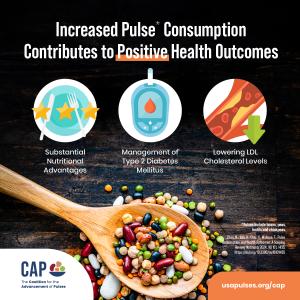The DGAC proposes to boost pulse consumption in 2025 guidelines, recognizing pulses' role in health and sustainability as a vital protein and nutrient source.
MOSCOW, ID, UNITED STATES, October 29, 2024 /EINPresswire.com/ -- The Coalition for the Advancement of Pulses (CAP) applauds the 2025 Dietary Guidelines Advisory Committee's (DGAC) proposal to increase the weekly recommendation for beans, peas, lentils, and chickpeas (collectively referred to as pulses) in the upcoming Dietary Guidelines for Americans. This significant announcement was made during the DGAC's public meeting in October 2024.The Committee's proposal is backed by extensive research demonstrating the health benefits of higher pulse crop consumption. Pulses are sustainable, affordable, and nutrient-dense sources of protein, dietary fiber, and other essential nutrients like iron, potassium, and folate. Consuming more pulses plays a vital role in weight management and in reducing the risk of chronic diseases, including heart disease and diabetes.
The previous Dietary Guidelines recommended only modest pulse consumption, which is inconsistent with current scientific evidence and global dietary guidance. CAP strongly encourages the U.S. Department of Agriculture (USDA) and the Department of Health and Human Services (HHS) to adopt the DGAC's recommendation to increase the weekly recommendation for "Beans, Peas, and Lentils" in the 2025 Dietary Guidelines for Americans. "This is a historic moment," said Tim McGreevy, Chief Executive Officer of the American Pulse Association (APA). "The science is clear that higher pulse consumption is linked to better health outcomes. Increasing the recommendation in the Dietary Guidelines is a pivotal step toward improving public health."
The Committee also shared a proposal to move "Beans, Peas, and Lentils" from the Vegetable Food Group to the Protein Food Group in the visual materials used to promote the Dietary Guidelines.
Historically, pulses have been visually displayed with the Vegetable Food Group but have been dually classified as both a vegetable and a protein because they have similar nutrient profiles to both food groups. The Committee engaged in a lively discussion to explore creative solutions for promoting the protein contribution of pulses, with ideas ranging from moving pulses to the Protein Food Group, keeping pulses in both food groups, or even creating a new separate food group.
"This is an important conversation," McGreevy emphasized. "We are energized that the Committee is thoughtfully considering how the placement of pulses can better highlight their protein content. However, emphasizing pulses as a protein source should not result in removing their classification as a vegetable. Any change to completely remove pulses from the Vegetable Food Group could have unintended regulatory consequences, such as reducing their availability in school meals or limiting their inclusion in health programs like produce prescriptions. USDA and HHS must carefully consider potential regulatory impacts before making reclassification decisions. The Departments should engage stakeholders in a robust discussion to better understand both the potential communication benefits as well as potential consequences of any changes."
CAP looks forward to reviewing the DGAC Scientific Report later this year and will continue collaborating with the Departments, healthcare professionals, and the public to promote the inclusion of pulses in American diets.
ABOUT PULSES & THE COALITION FOR THE ADVANCEMENT OF PULSES
Pulses are the nutritionally dense, dry edible seeds of legumes, including beans, peas, lentils, and chickpeas. The leading pulse-producing states are Washington, Idaho, Oregon, Montana, North Dakota, South Dakota, Minnesota, Nebraska, Colorado, Wyoming, Michigan, Wisconsin, California, Arizona, Texas, and Iowa.
The Coalition for the Advancement of Pulses (CAP) is an initiative led by the American Pulse Association (APA) with support from the USA Dry Pea and Lentil Council (USADPLC), the U.S. Dry Bean Council (USDBC), and the Pulse Foundation. The CAP coalition represents a collective of pulse crop growers, processors, manufacturers, and related organizations. CAP is committed to increasing the consumption of pulses in the United States by increasing research on the nutritional benefits of pulses and growing awareness about the many health benefits of pulse crops. For more information visit usapulses.org or contact CAP@usapulses.org.
Drex Rhoades
USADPLC
+1 208-596-7799
email us here
Legal Disclaimer:
EIN Presswire provides this news content "as is" without warranty of any kind. We do not accept any responsibility or liability for the accuracy, content, images, videos, licenses, completeness, legality, or reliability of the information contained in this article. If you have any complaints or copyright issues related to this article, kindly contact the author above.
© 2024 Benzinga.com. Benzinga does not provide investment advice. All rights reserved.
Comments
Trade confidently with insights and alerts from analyst ratings, free reports and breaking news that affects the stocks you care about.
